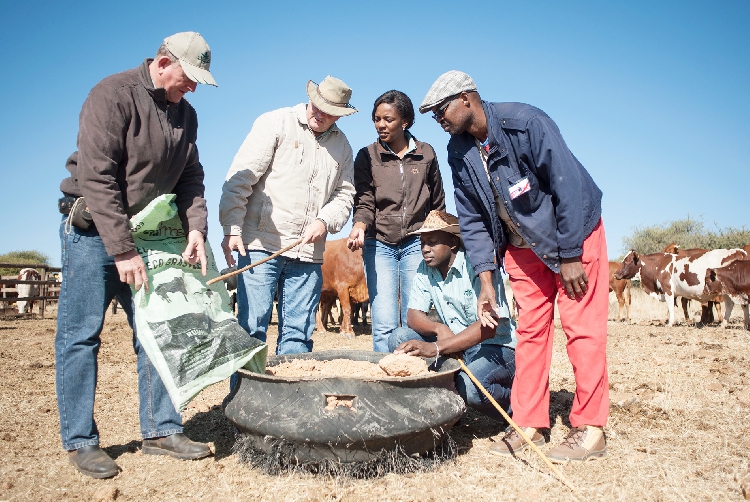AGRICULTURE is the lifeblood of Namibia, it is in our bones, in our dreams and what’s more, farming is also Namibia’s reality. It does not matter what Mother Earth throws at us, every Namibian farmer continues to raise cattle or tends a plot of land.
The farmers have taken up the responsibility, sometimes for generations, to feed Namibia. “At least once in a lifetime you will need a doctor, a lawyer, an architect – but every day, three times a day, you will need a farmer!” This famous, yet anonymous Argentinian quote sums up the essence of farming and how vital it is.
To continue and develop the farming tradition in Namibia, it is imperative that education in the field of agriculture takes place at all levels. It is the only way that farming has a long-term future in Namibia.
Agriculture is a vital sector that has been part of Namibia’s development programmes and is the first link in the value chain for the ‘Growth at Home’ drive.
The farming sector positively contributes to the GDP of the Namibian economy and employs at least 1/3 of Namibia’s working population. According to the World Bank, agriculture contributed 7,07% of GDP 2013. These figures demonstrate the importance of farming and why it is vital to the nation.
Agriculture, if it should remain the backbone of the Namibian economy, needs to be taken seriously, just like any other sector. The nation needs to be educated properly about agriculturral production; to increase the contribution to the economy as well as to food security.
Namibians also need to be informed and ready to deal with the environmental impact of climate change.
One of the aspects that requires education is the environmental impact of climate change in Namibia.
The European Union as well as local players like Agra see the importance of educating the farmers as well as government and other stakeholders on this topic.
This means farmers need to be educated on the reduction of carbon emissions over the coming years, as well as generating more energy from renewable sources and general improvements of using energy resources more efficiently.
Without workshops, action plans and long-term planning to face the environmental impact that climate change is bringing with it, the outlook for farming in Namibia is bleak. That is why organisations like Agra are positioned to consult Namibian farmers on these topics.
Agra ProVision in partnership with Agri-Ecological Services are implementing a three-year project funded through the European Union ‘climate change adaptation and mitigation, including energy’ programme.
The project aims to develop and test a rangeland early warning and monitoring system for livestock farmers in Namibia. The overall objective is to enhance the ability of livestock farmers, support agencies and policy makers to make decisions based on timely and accurate information regarding the state and productivity of their rangelands to reduce vulnerability to droughts.
This is essential in the current climate and with the lack of rain that Namibia is experiencing.
Veld conditions are poor and mainly dominated by annual grasses.
Moreover, over the long term, there is a need to improve the condition and productivity of the veld, in terms of preventing soil erosion and nutrient depletion, improved water infiltration, and improving veld condition in terms of increasing the proportion of perennial grasses and addressing the negative effects of bush encroachment.
This can only be countered through widespread education.
Agricultural education comes in many formats and can include conservation, horticulture, land management, rangeland management, agricultural science, animal welfare and care, machine and shop classes, health and nutrition, livestock management and biology courses.
Training and education surrounding the farming sector never ceases as there are new developments all the time and this is where organisations like Agra’s ProVision offers assistance, solutions, guidance and expert knowledge.
Only through sharing information, best practices, case studies and holding workshops on agricultural practices can Namibia continue to profit from farming.
The aim is to create a sustainable, profitable agriculture sector. That is where the aspirational and education aspect of farming plays an important role.
The status of farming can and needs to be raised in Namibia.
Knowing that it is an intrinsic and important part of the Namibian economy should make people change their attitudes towards farming and farmers at all levels and in all regions. Organisations like the Meat Board, Agronomic Board, Meatco, but especially Agra and its capacity development professional services and research unit, ProVision and the government of Namibia have a duty of care to work together with the farmers, and educate them to further develop the sector for the long term.
It is definitely worth the effort to do so, not just for the farmers, but for Namibia, the economy and every Namibian.
Stay informed with The Namibian – your source for credible journalism. Get in-depth reporting and opinions for
only N$85 a month. Invest in journalism, invest in democracy –
Subscribe Now!






